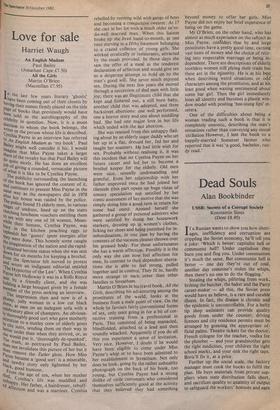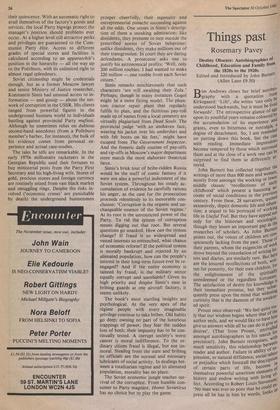Dead Souls
Alan Bookbinder
USSR: Secrets of a Corrupt Society Konstantin Simis (Dent £8.95)
If a Russian wants to show you how short- ages, inefficiency and corruption are crippling the Soviet economy, he'll tell you a joke: 'Which is better: capitalist hell or communist hell? Under capitalism they burn you and flog you. Under communism it's much the same. But communist hell is better — one day they're out of coal, another day someone's stolen the whips, then there's no one to do the flogging.'
Stealing the whips, pilfering from work, bribing the butcher, the baker and the Party career-maker — all this, the Soviet press would have us believe, is a rare and curable illness. In fact, the disease is chronic and the epidemic is uncontrollable. For a hefty tip shop assistants can provide quality goods from under the counter; driving licences and city residence permits must be arranged by greasing the appropriate of- ficial palms. Theatre tickets for the doctor, French cologne for the teacher, vodka for the plumber — and your grandmother gets the right medicines, your children the right school marks, and your sink the right taps. Boris'll fix it, at a price.
Further up the social scale, the factory manager must cook the books to fulfil the plan. He buys materials front private sup- pliers when state distribution falls short, and sacrifices quality to quantity of output to safeguard the workers' bonuses and earn
their quiescence. With an automatic right to avail themselves of the factory's goods and services, the local Party bigwigs protect the manager's position should problems ever occur. At a higher level still attractive perks and privileges are guaranteed to the Com- munist Party elite. Access to different grades of special stores and facilities is calculated according to an apparatchik's position in the hierarchy — all the way up to the Politburo, with its unlimited right to almost regal splendours.
Soviet citizenship might be credentials enough, but as a former Moscow lawyer and senior Ministry of Justice researcher, Konstantin Simis had unusual access to in- formation — and gossip — about the net- work of corruption in the USSR. His clients ranged from powerful figures in the underground business world to individuals battling against provincial Party mafiosi. Although he sometimes relies on dubious second-hand anecdotes (from a Politburo member's barber, for instance), the bulk of his evidence comes from personal ex- perience and actual case-studies.
The tales he tells are remarkable. In the early 1970s millionaire racketeers in the Georgian Republic used their fortunes to buy ministerial posts from the Party First Secretary and his high-living wife. Stores of gold, precious stones and foreign currency are routinely seized from vast black market and smuggling rings. Despite the risks in- volved ('economic crimes' are punishable by death) the underground businessmen prosper cheerfully, their ingenuity and entrepreneurial panache succeeding against all the odds. One senses in Simis's descrip- tion of them a sneaking admiration: like dissidents, they presume to step outside the prescribed norms of Soviet behaviour; unlike dissidents, they make millions out of their transgression. In court they are daring defendants. A prosecutor asks one to justify his astronomical profits: 'Well, only 200 million roubles. I had wanted to make 220 million — one rouble from each Soviet citizen.'
Simis remarks mischievously that such characters 'are still awaiting their Zola.' Perhaps; though in many instances Gogol might be a more fitting model. The phan- tom tractor repair plant that regularly fulfils its plan, and the fictitious pay-roll made up of names from a local cemetery are virtually plagiarised from Dead Souls. The provincial judge 'with an unshaven face, wearing his jacket over his undershirt and with felt boots on his feet,' might have escaped from The Government Inspector. And the frenetic daily routine of pay-offs and rip-offs in Moscow's major department store match the most elaborate theatrical farce.
Simis's brisk tour of bribe-ridden Russia would be the stuff of comic fantasy if it were not also a powerful indictment of the Soviet system. Throughout his steady ac- cumulation of evidence he carefully rations his anger, as the case for the prosecution proceeds relentlessly to its inexorable con- clusion: 'Corruption is the organic and un- changeable .essence of the Soviet regime.' At its root is the unrestricted power of the Party. To rid the system of corruption means digging out that root. But several questions go unasked. How can the system change? If fraud is so widespread and vested interests so entrenched, what chance of economic reform? If the political system is morally bankrupt and rejected by an alienated population, how can the people's interest in their long-term future ever be re- engaged? And if the entire economy is tainted by fraud, is the military sector equally corrupt and unreliable? Given its high priority and despite Simis's ease in bribing guards at one aircraft factory, it seems unlikely.
The book's most startling insights are psychological. At the very apex of the regime people with every imaginable privilege continue to take bribes. Old habits go deep; owning no part of the luxurious trappings of power, they fear the sudden loss of both; their impunity has to be con- tinually tested. A corrupt society's worst cancer is moral indifference. To the or- dinary citizen fraud is illegal, but not im- moral. Stealing from the state and bribing its officials are the normal and necessary lubricants of social activity. In dealings bet- ween a totalitarian regime and its alienated population, morality has no place.
The Soviet economic jungle teaches sur- vival of the corruptest. From humble con- sumer to Party magnate, Homo Sovieticus has no choice but to play the game.











































 Previous page
Previous page